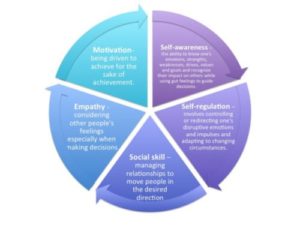Right now, CEOs are facing larger and more diverse challenges than ever before.
The daily volatility created by the pandemic as well as racial inequality, gender inequality, economic and social uncertainty and other global and local systemic issues.
There are shifts happening globally as the power social media yields is being used to awaken the masses to everything that is crucial to be addressed in the world, and the intertwined relationship consumers and corporations have in this.
CEOs are considered some of the most intelligent people within a company. It’s the main reason why they rise to the top and lead their organizations.
However, growing evidence supports the fact that intellectual intelligence is no longer the most important factor to being a successful CEO.
Emotional intelligence is.
Key data for this is provided further down the newsletter.
Personally, I built and sold 2 companies in my 20’s, I did so mostly unaware of my lack of EI during that time. It was hard for people to work with me as the leader.
For example, like most CEOs, I’m prone to vision, so I’d constantly be coming up with ideas to execute without awareness of what it would take, driving my operations team crazy, and leading to unneeded stress and fear on their end.
Once I brought awareness to how my mind and behaviors were built, I was able to make the shifts and collaborate properly.
The truth is, in order to navigate the challenges outlined above, a degree of self awareness and the awareness of others is needed.
The simplest way for me to put it would be to have your ego in check.
As humans, we have two parts.
The human part… this is who we are as a physical presence and the roles we play in life and as part of a species.
Mother, Father, Son, Daughter, CEO etc…
These identities can feed our egos and cause overthinking and misalignment patterns to develop.
And we have the ‘being’ part.
Bear with me… I’m going full woo woo for a moment. Trust me, it’s relevant.
Your being is what lies beneath the social conformities and the feelings and beliefs we habitually experience.
Being, or pure consciousness, is what you are in respect to the universe.
The easiest way for me to explain it is that it’s essentially an absence of thinking.
Because it’s our thinking that causes us to experience certain feelings, it’s what causes stress, anxiety and overwhelms.
It’s what causes us to take action based on disempowering beliefs.
Now, you may be wondering what on earth this ‘being’ has to do with becoming a successful CEO.
So let me explain.
When you develop the ability to manage your feelings by no longer allowing your thoughts and beliefs to run your life, you start to create this ‘space’ around how you feel and what you believe.
This space allows you to have the perspective and time to pause and listen to what’s really going on.
You no longer take action based on your initial feelings and reactions. You start to take more thought through action that better serves both you, the people around you and your company.
Is this starting to make a little more sense?
So what I’m going to go through in the rest of this Newsletter is what you as a high-performing CEO need to do to develop a heightened level of self awareness and emotional intelligence and why it’s so important.
We’re going to cover:
- The data on emotional intelligence.
- What is emotional intelligence?
- The clear benefits of an emotionally intelligent CEO.
- How emotionally intelligent CEOs harness their power.
- The feelings & beliefs around emotional intelligence.
- The action steps to becoming a more emotionally intelligent leader.
The Data On Emotional Intelligence
Let’s kick things off by looking at the data around emotional intelligence and why it makes such a difference to your performance as a CEO.
- 90% of top performers scored high on emotional intelligence and just 20% of low performers scored high on emotional intelligence. Which shows emotional intelligence doesn’t guarantee your success on it’s own but does increase your chances of developing the skills required to be more successful.
- EQ is responsible for 58% of professional success, regardless of job category — Of all the workplace skills a person can possess, none is more impactful than EQ.
- PepsiCo performed an internal study revealing that managers with highly developed EQ skills outperformed yearly revenue targets by 15-20%; managers with low emotional intelligence underperformed at the same rate.
This data shows us that leaders who have a higher level of emotional intelligence possess the qualities that drive both themselves and their teams to exceed expectations.
What Is Emotional Intelligence?
We’ve gone a little woo woo, looked at the data and you still may be wondering What Is Emotional Intelligence.
According to Wikipedia:
“Emotional intelligence (EI), also known as Emotional quotient (EQ), is the capability of individuals to recognize their own emotions and those of others, discern between different feelings and label them appropriately, use emotional information to guide thinking and behavior, and manage and/or adjust emotions to adapt to environments or achieve one’s goal(s).”
Emotional Intelligence can be further broken down into 5 areas.

Let’s break each area down further.
Self Awareness
We often think about self-awareness as a set of practices that allows one to identify subtle aspects of our emotional state like mood or body language so we can take steps to regulate our demeanour.
With the day to day hustle of working with others, jumping from meeting to meeting, task to task, it can be easy to lose sight of these important factors and the way others can and likely will be affected by how we feel.
Self Regulation
This is the ability to think before you speak.
Being aware of how you may be affecting others is one thing, but without the ability to consciously act on that awareness, you will not be likely to control emotions in times of high stress or pressure.
Pay attention to subtle cues that show how others may be perceiving your actions as they serve to hint at improvements you can make with your communication style.
Motivation
Consistently keeping in mind your values and goals for set periods of time will only serve to improve your position in and outside of the office as time goes on.
Keeping your Massive Transformative Purpose front and centre within your company will help motivate team members and align their work with the end goal.
From a leadership perspective it’s important to do this so it instills in people at all levels within your company the performance metrics that need to be tracked.
Empathy
Empathy is the ability to identify another person’s emotional state in the moment, and react accordingly.
That being said, some use their empathic abilities in order to manipulate others’ actions (which does not work well in the long-run).
The connection between empathy and emotional intelligence can and should be used for benefitting yourself and others simultaneously. For example, with respect to client engagements, people at all levels of organizations in any industry struggle with barriers in terms of authority, resource availability, as well as factors outside of the workplace that can affect their overall mood or willingness to perform certain tasks.
Social Skills
In service-oriented organizations (e.g., a consulting firm like TSI), the ability to hone your social skills and effectively network with others, and step outside of your comfort zone at times, can make or break performance. Not only that, but it’s also important to understand that those you surround yourself with will play a large part in your everyday life.
The Clear Benefits Of An Emotionally Intelligent CEO
Now we’re going to take a brief look at how the 5 areas of emotional intelligence impact leadership, culture and growth within your organization.
- Better teamwork.
Teams with emotionally intelligent members are great at working together. They have good communication, trust each other, and value each other’s input. When someone makes a suggestion, they’re able to respond in a positive and productive way.
- Dealing with change.
Emotional intelligence gives you the tools you need to deal with any change that comes your way.
In the workplace, many people often face change with a negative attitude and crossed arms; but an emotionally intelligent person will be much more positive and can inspire other team members to feel the same way.
- Tough conversations.
Whether it’s an angry customer or an upset team member, difficult conversations can stir up all sorts of emotions.
If you have the right skills, you can handle those conversations by emotionally connecting with the other person before finding a resolution.
- People Skills.
Emotional intelligence allows you to quickly build trust with people, as well as a rapport.
You’ll be able to understand their feelings and empathise with them – fantastic for any role that involves working in teams!
- Strong Leadership.
Great leaders understand people; they know how they work, how to influence them, and how to inspire them.
Emotional intelligence will help you to achieve this understanding in order to be a brilliant leader and guide your team in the right direction.
How Emotionally Intelligent CEOs Harness Their Power
It’s all well and good talking about the impact an emotionally connected CEO can have.
Let’s take it one step further and look at a couple of real life examples where high-performing CEOs have harnessed their emotional intelligence and used it as a force for good.

Indri Nooyi, CEO of PepsiCo
After a visit to India to visit her parents, Nooyi explains how she realized her parents were responsible for much of her success and they deserved the praise.
Sitting in her mom’s living room, an endless stream of visitors and random people started showing up, telling her mom what a good job she had done raising her daughter.
“It occurred to me that I had never thanked the parents of my executives for the gift of their child to PepsiCo,” she says.
When she returned home, Nooyi wrote a letter to the parents of each of the members of her executive team. “I wrote a paragraph about what their child was doing at PepsiCo,” she says. “I said, ‘Thank you for the gift of your child to our company.’”
Parents wrote back to her, saying they were honored. Some of the executives even told her it was the best thing that had ever happened to their parents.
Nooyi says the way to hold on to employees is by “hooking them emotionally to the job, through the company’s business model and what it stands for.”
“You need to look at the employee and say, ‘I value you as a person. I know that you have a life beyond PepsiCo, and I’m going to respect you for your entire life, not just treat you as employee number 4,567,’” she says.
Key takeaways: Through her unique and unusual display of gratitude, Nooyi bonded with her executive team in a heartfelt and deeply personal way that helped her build loyalty and morale.

Satya Nadella, CEO of Microsoft
One embarrassing failure under his watch was the launch of a Twitter bot named Tay designed to advance artificial intelligence communication.
The public experiment went horribly wrong when people started taking advantage of the bot and tweeting racist and profane comments.
Engineers on the Tay project experienced something a little out of the ordinary when Nadella sent them an email, including the following:
“Keep pushing, and know that I am with you… (The) key is to keep learning and improving”
Nadella says it’s critical for leaders “not to freak people out, but to give them air cover to solve the real problem.”
“If people are doing things out of fear, it’s hard or impossible to actually drive any innovation,” says Nadella.
The team went on to create Zo, a new AI chatbot that was launched last year and so far, so good.
Key takeaways: We’re only human and everyone makes mistakes. Nadella’s email showed his employees that he has their back.
By encouraging them to learn from the experience, rather than scold them over a public failure, he motivated them to continue giving the project their all.
The Feelings And Beliefs Around Emotional Intelligence
The first step to leading your company in an emotionally aligned manner is to align your feelings and beliefs.
From there, you can develop empathy, self awareness, self restraint as well as the other key traits and emotionally aligned CEOs should have.
Undesired Feelings:
- Distrust
- Frustrated
- Not enough
- Anxious
- Fear
Limiting Beliefs:
- I don’t trust people because they are selfish and will let me down.
- I’m frustrated because only I can do work to my standard.
- No matter what I achieve I still won’t be enough.
- I feel anxious about all the work I need to get done.
- What if this doesn’t work?
Let’s now look at the feelings and beliefs you can embody to live life as a more emotionally aligned CEO.
Desired Feelings:
- Loving
- Supported
- Grateful
- Organised
- Empowered
Empowering beliefs:
- I love meeting and connecting with new people every day.
- I feel supported by the incredible team I’ve built.
- I’m grateful for everything I’ve achieved so far in my life.
- I’m organised because I have an optimised calendar and effective project management systems.
- I am empowered to take my company in a new direction that is more beneficial.
Action Steps To Become An Emotionally Intelligent CEO
ACTION STEP 1] Start practicing empathy
Whenever you feel yourself getting into a disagreement, pause for a second and put yourself in the other person’s shoes and try to see things from their perspective.
When you make mistakes, step back and examine what went wrong so you can learn from what happened and do better next time. Think about what motivates you and take note if you are motivated by money and power rather than something you care about.
ACTION STEP 2] Use meditation to become an emotionally intelligent leader
Just as an athlete trains their body for optimal performance, a leader can train their mind for high-performance.
Meditation is not just spiritual fluff, studies have shown it actually restructures the brain and can weaken neuro-pathways to the part of the brain that controls our prial responses such as fear and anger.
It also strengthens neurological pathways to the assessment centre of the brain resulting in a more thoughtful, and less emotionally driven CEO.
Here is a guided meditation for all CEOs to try.
ACTION STEP 3] Practice emotional vulnerability
Journaling has a plethora of benefits related to emotional intelligence.
It’s a simple, yet effective way to manage your thoughts and feelings. You can use writing as a way of invoking the more rational and analytical part of your brain.
Here is an in-depth article walking you through how to journal properly and get maximum benefit from the practice.
One of our clients Eduardo Parada, CEO of Campos Pachama, had this to say about his time working with Lifestyle Perfected.
“Together we have dug into my empowering and limited beliefs to pull the weeds together, making room for what I want. From there we developed an action plan that has transformed my vision, feelings and actions toward business partners, family and myself.
I finally understood how becoming a conscious entrepreneur is not only about creating sustainable processes, products and profit. It’s about creating the right connection with your team through trust and alignment.
It’s a beautiful process that is going to require you to leave your ego out of the conversations in order to find clarity and solutions to your challenges.”
If you’d like to learn more about how we can help you elevate the emotional alignment within your company, reply to this email or alternatively, you can see our programs for CEOs and for teams here.
We’re also excited to announce the CEO Circle. A group for CEOs to elevate emotional intelligence, increase impact and legacy wealth. If you are CEO and/or a founder with $1 million or more in revenue or assets apply here.
Sending you love,
Nadav
& the Lifestyle Perfected team

